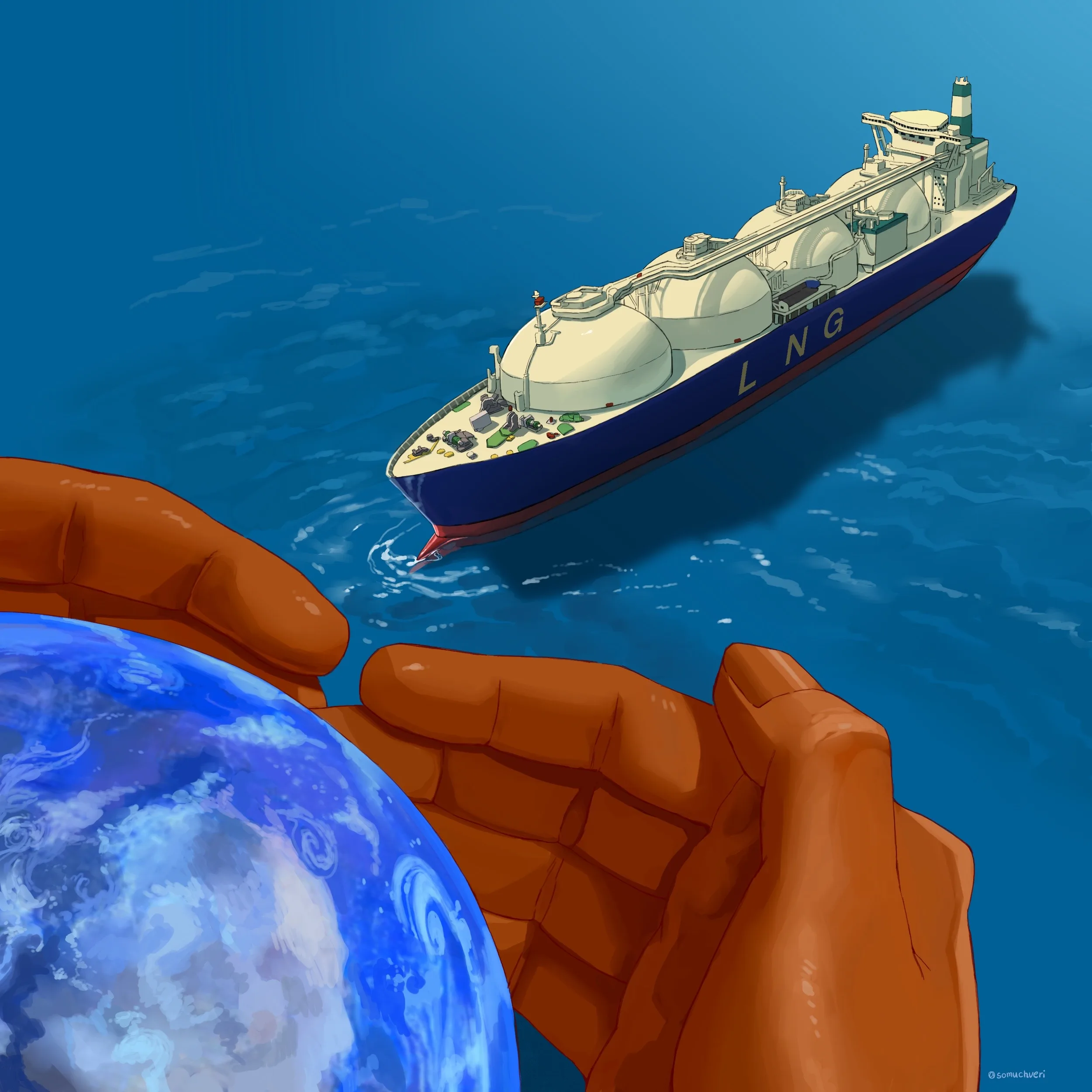Setting the Record Straight: Say No to LNG Responds to SEA-LNG
Our campaign is intended to be a resource for policy makers, financiers, and the shipping industry to plan for incoming methane regulations and address the financial challenges ahead.

“Our health, the health of our planet, and our future is constantly being abducted by the decisions of those in power.”
– Chris C, Say No to LNG Youth ArtistSay No to LNG Responds to SEA-LNG Statement
Say No to LNG is a global campaign that serves as a collective voice for civil society in tackling the greenwashing of Liquefied Natural Gas (LNG) as a “climate-friendly” marine shipping fuel. Central to our campaign is the reliance on rigorous scientific evidence, drawing from the expertise of scientists, technical advisors, community leaders, and other knowledge holders.
Denying scientific evidence in favor of economic and political agendas is detrimental to advancing the shipping sector towards a zero-emissions, sustainable future. In light of this, we are committed to ensuring that decision-making processes are informed by robust evidence and that communities adversely impacted by LNG projects are provided a platform to voice their concerns.
SEA-LNG, a coalition dedicated to promoting the use of LNG as a marine fuel, is hailing it as a “step in the right direction” towards achieving zero emissions. However, the LNG supply chain is developing under a business-as-usual scenario, risking irreparable damage to our planet and future generations. Meanwhile, communities negatively impacted by LNG projects, whether on land or at sea, continue to be told that their narratives have no place in “responsible dialogue”.
We consider accountability a fundamental guiding principle, including, but not limited to, holding the shipping industry accountable to meet the greenhouse gas (GHG) reduction targets under the Paris Agreement. To demonstrate LNG as a Paris-aligned pathway, SEA-LNG emphasizes the life-cycle GHG savings of the lowest methane-slip engine technology. However, this calculation overlooks the significant warming potential of methane in the near term, with a 100-year outlook masking its true impact.
Without citing evidence or further explanation, SEA-LNG also claims that the LNG-fueled vessel order book is dominated by lower methane-slip engines. Identifying a high proportion of these engines installed or on order does not equate to lower methane emissions. Instead, it is crucial to consider the relative proportion of fuel consumed by engine type to accurately assess its environmental impact.
To achieve decarbonization in shipping, we need to invest in energy efficiency and operational measures in the short term. This will immediately reduce GHG emissions and provide a transition period to zero-emissions fuels.
SEA-LNG claims that our campaign is delaying investments needed for this transition. This argument serves as a prime example of climate-delay discourse exercised by groups heavily invested in natural gas. We understand that coalitions like SEA-LNG are formed to maximize their influence and prevent credible opposition from emerging. Nonetheless, our campaign remains steadfast in our commitment to a zero-emissions future for the shipping industry.
Say No to LNG’s very existence is resistance to the status quo. We will continue to amplify the voices of – and stand in solidarity with – communities most vulnerable to the impacts of LNG. We will also continue to work alongside industry players to say no to LNG, fostering more holistic and evidence-based pathways toward shipping decarbonization.
Say No to LNG should be viewed as a resource for policy makers, financiers, and the shipping industry to plan for incoming methane regulations and address the financial challenges ahead, including the devaluation and premature liability associated with LNG infrastructure. By investing in energy-efficiency measures, and the development of zero-emissions fuels now, we can collectively and equitably move towards a sustainable shipping industry and liveable future for all.
For more information, supporting resources, and other queries, please reach out to [email protected] or explore our website at www.saynotolng.org.